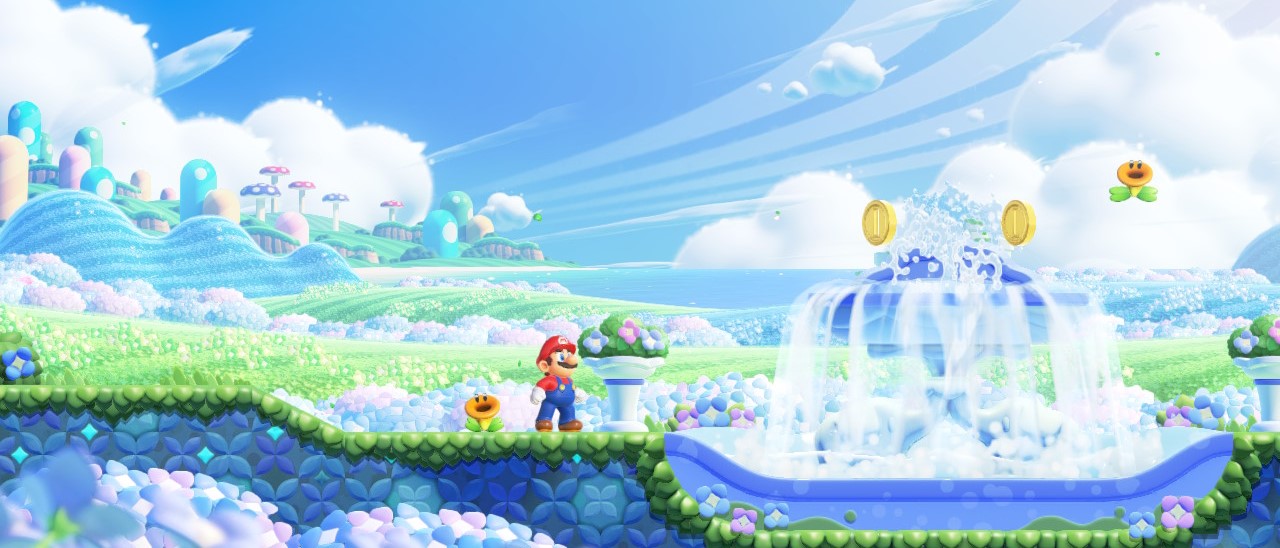Tom's Guide Verdict
Super Mario Bros. Wonder takes the best parts of past 2D Mario games and builds on them with new characters, gameplay mechanics and upgraded visuals. There’s something here for both fans of the series and newcomers alike, with local and online multiplayer to keep you coming back after you’ve finished the main story.
Pros
- +
Loads of playable characters
- +
Excellent visuals and soundtrack
- +
Wonder Flowers significantly alter levels
- +
Badge mechanic adds a new level of strategy
Cons
- -
Feels slightly short
Why you can trust Tom's Guide
Platform: Nintendo Switch
Price: $60
Release Date: 11/20/2023
Genre: Platformer
Length: 10 to 15 hours
Super Mario Bros. Wonder takes 2D Mario in a new direction without losing what made the original games great, while adding plenty of new ideas and gameplay mechanics at the same time. Whether this is your first side-scrolling platformer or you grew up playing Super Mario Bros. 3 or Super Mario World, controlling Mario still feels as natural as ever, even with all of the changes Nintendo has made. From collecting all of the Wonder Seeds in a particular level to earning badges to gain access to Mario’s new abilities, there’s a ton to do in Super Mario Bros. Wonder whether you’re playing by yourself or with friends locally or online.
While there are a total of 152 different levels across seven worlds (and a bonus one), each stage also contains a Wonder Flower that changes things drastically. The level you’re playing may be completely transformed, or it could even be Mario himself that changes to mix up the gameplay. This adds quite a lot to the Mario experience as do the new characters, enemies and environments you’ll encounter in the Flower Kingdom.
Besides being the prettiest 2D Mario game to date with new visuals and updated animations, Super Mario Bros. Wonder really does manage to capture that feeling of ‘wonder’ as you make your way through levels looking for secret paths, Wonder Flowers and new areas to explore. Likewise, you’re not limited to playing as Mario since there are multiple playable characters that all control and play a bit differently including Luigi, Princess Peach, Toad, Yoshi and more. Our Super Mario Bros. Wonder review will help you decide if this is the best Nintendo Switch game for you and whether or not the changes Nintendo has made to its tried and true formula are for better or worse.
Super Mario Bros. Wonder review: Gameplay

If you’ve played a 2D Mario game before, you’ll be right at home with Super Mario Bros. Wonder. Just like in previous games, the goal is to get to the flagpole at the end of the level where you’ll receive a Wonder Seed for completing the course. However, this time around, you’re also encouraged to look for hidden Wonder Flowers in the middle of each level to obtain an additional Wonder Seed or even two in some courses. In practice, this feels a lot like trying to get all of the green stars in Super Mario 3D World.
There are several other changes Nintendo has made to mix things up. For starters, there’s no longer a timer for each level, which takes some of the pressure off while encouraging more exploration to find coins, power-ups and of course, Wonder Flowers. Super Mario Bros. Wonder also adds Flower Coins to the mix which can be exchanged at Poplin Shops for extra lives, Wonder Seeds and badges—more on that later.
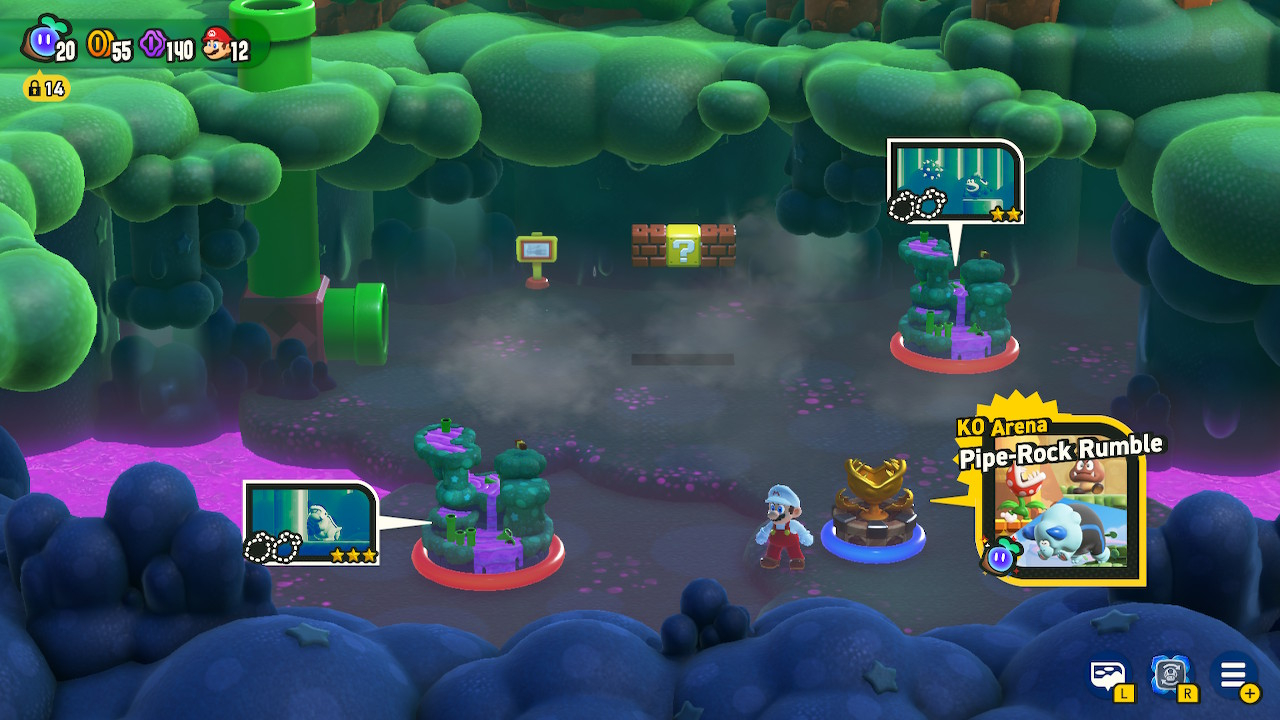
In addition to removing countdown timers, Super Mario Bros. Wonder has added a difficulty level to each course. This lets you know how hard a course will be before you start it. If you’re having trouble with a particular level though, you can always change your character before trying it again, as both Yoshi and Nabbit don’t take any damage.
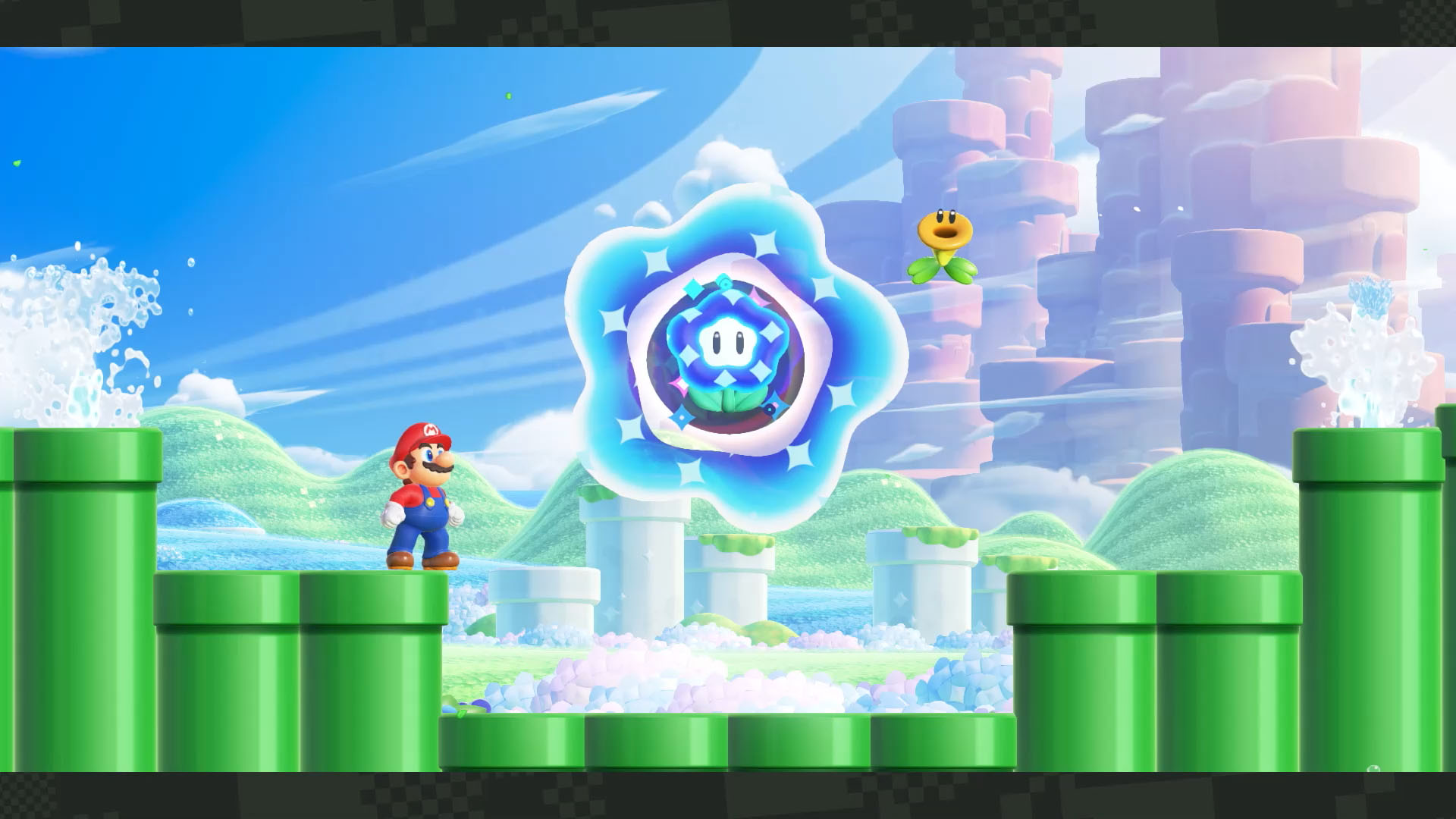
Finding them and seeing how each Wonder Flower will change a level is another aspect of Super Mario Bros. Wonder that I really enjoyed. Some are harder to find than others but fortunately, the new Talking Flowers throughout each course help point you in the right direction. They may say “Are you forgetting something?” or “Something feels… off…” to let you know that you’re in the vicinity of a Wonder Flower. The Talking Flowers certainly helped me find missing Wonder Flowers, though they also provided a bit of comic relief as well as encouragement during my own playthrough of Super Mario Bros. Wonder.

Once you touch a Wonder Flower, the stage you’re on may be changed into something else entirely. However, you may also find yourself transported to a new location or transformed into one of the game’s enemies, just like in Super Mario Odyssey. In the screenshot above, touching the level’s Wonder Flower made the game shift from a straight on view of the course into an overhead one. During these types of Wonder Flower stages, Mario (or whichever character you’re playing as) can take two hits regardless of whether or not you had a power-up before starting. Some of these portions of the game can be more difficult than others but thankfully, Wonder Flowers are typically located after a checkpoint, so it’s easy to try again.
Overall, Super Mario Bros. Wonder’s gameplay feels both familiar and novel at the same time, which is a real testament to all of the work the developers at Nintendo put into the game. Seasoned Mario players will find that enough is different about the game’s formula to feel that sense of wonder (pun intended) while there are plenty of special characters, power-ups and badges to make things easier for new players.
Super Mario Bros. Wonder review: Badges and power-ups
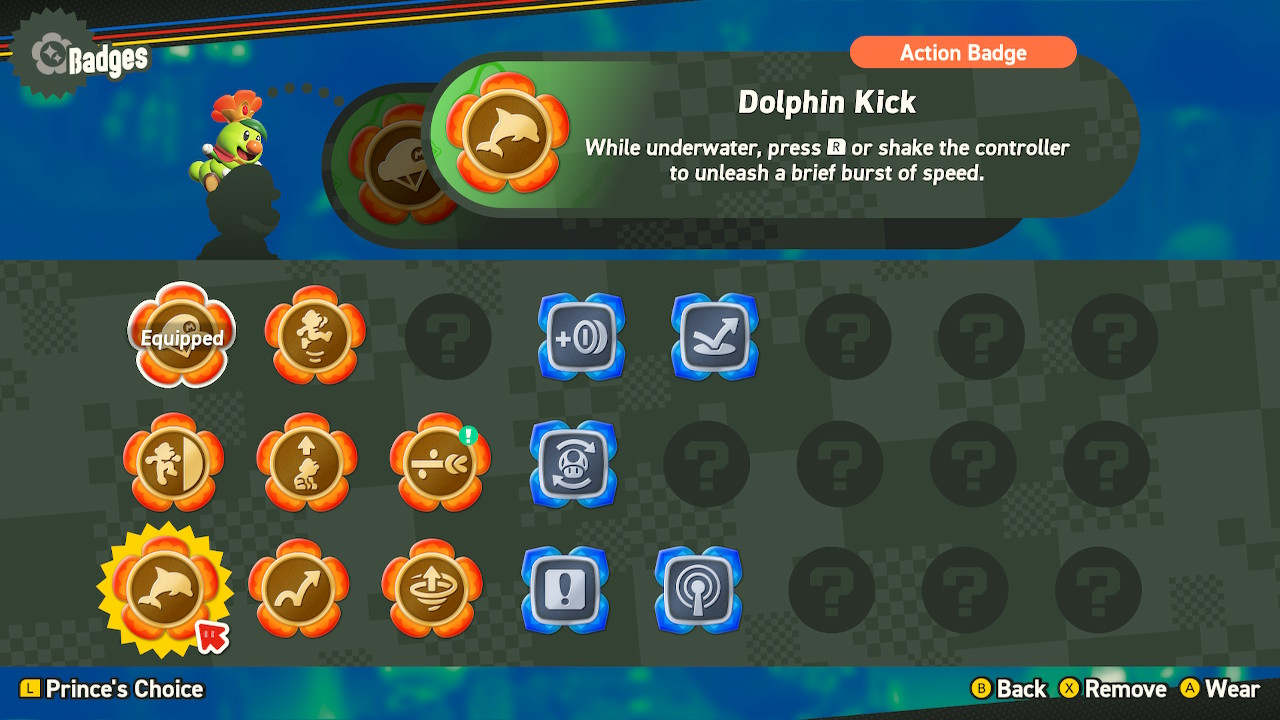
Another big addition to Super Mario Bros. Wonder are the badges you’re able to equip before the beginning of each level. There are 24 of them in total and they come in three different categories and colors: Action Badges (red), Boost Badges (blue) and Expert Badges (yellow).
\Action Badges give you new abilities like a crouching high jump, Boost Badges provide passive effects (such as starting each course with a Super Mushroom power-up) and Expert Badges apply powerful effects to your character like invisibility. As for how you acquire new badges, you get some from completing Badge Challenge stages while others can be purchased for 100 Flower Coins at Poplin Shops. All of the Expert Badges are obtained by completing the game’s much more difficult Expert Badge Challenge stages.
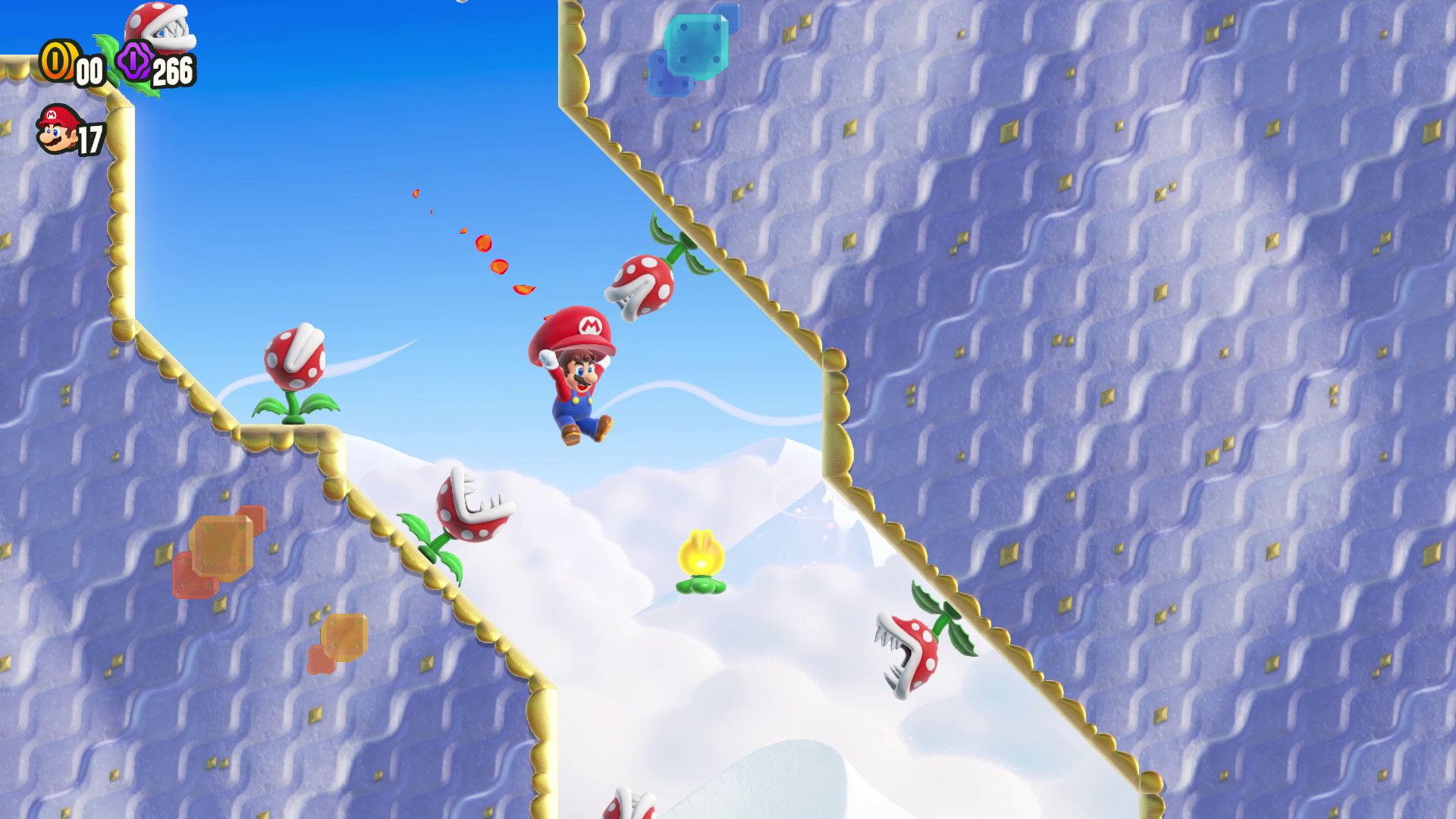
To use an Action Badge during a stage, you simply press “R” on your controller or Joy-Cons. However, if you have one of the best Nintendo Switch controllers with motion control, you can also shake your controller to activate some of the badges in Super Mario Bros. Wonder, like the Dolphin Kick badge, which gives you a brief burst of speed while underwater.
Badges can completely transform how you play Super Mario Bros. Wonder. If you don’t know which badge a particular level calls for, you can always tap on “L” in the badge selection menu to have Mario’s ally in the Flower Kingdom, Prince Florian, recommend the best one. You also don’t have to use them at all if you want a bit more challenge.
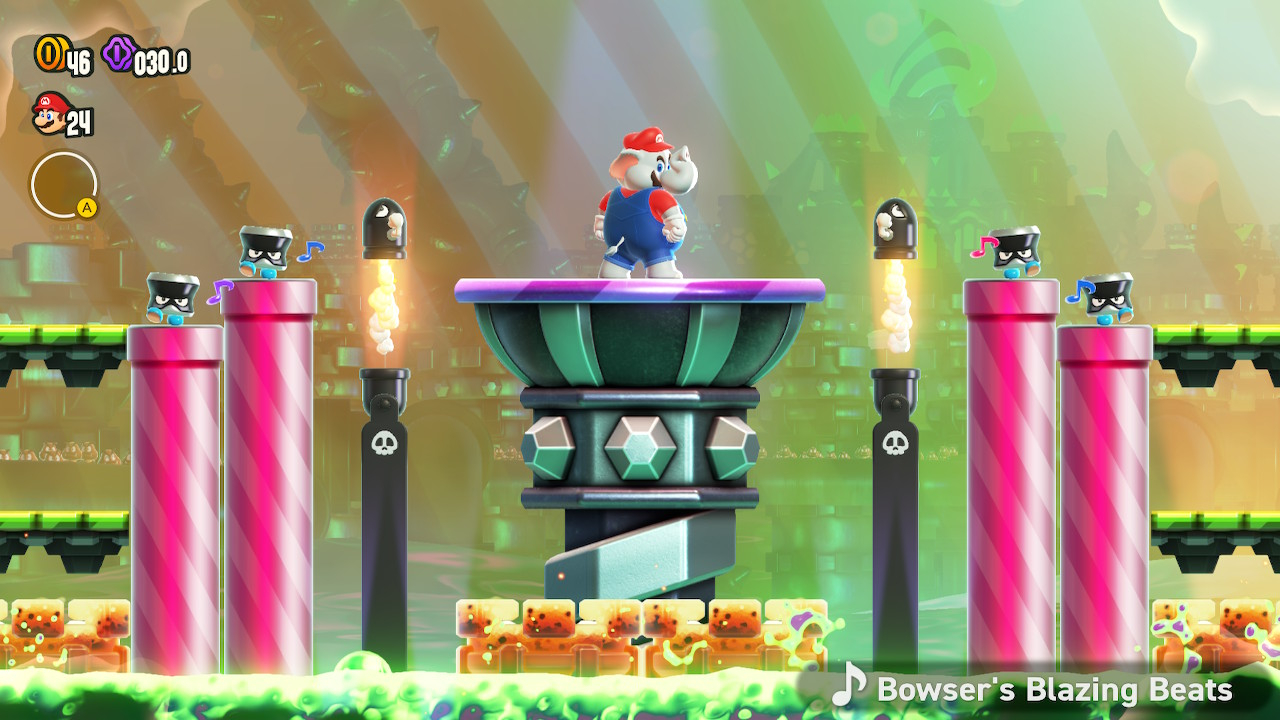
Alongside Mushrooms, Fire Flowers and Invincibility Stars, Super Mario Bros. Wonder also adds several new power-ups including Bubble Flowers, Drill Mushrooms and Elephant Fruits. While Elephant Mario was used to promote the game, the other new power-ups are also a lot of fun. Bubble Flowers let you throw bubbles in the same way that Fire Flowers let you hurl fireballs. However, you can also jump on the bubbles you’ve thrown to use them as platforms and navigate trickier levels easier. Drill Mushrooms give Mario a drill hat that he can use to attack enemies from underneath them, but this power-up also lets you burrow into the ground and move across the floor after a ground pound or travel along the ceiling after jumping upwards.
I found each of these new power-ups to not only be useful but fun as well, since they change how you control Mario and the game’s other playable characters. The Drill Mushroom let me reach areas I otherwise wouldn’t have been able to, while the Elephant Fruits add some extra bulk to Mario’s character, changing how you interact with enemies and traverse through the game’s courses.
Super Mario Bros. Wonder review: Visuals and sound
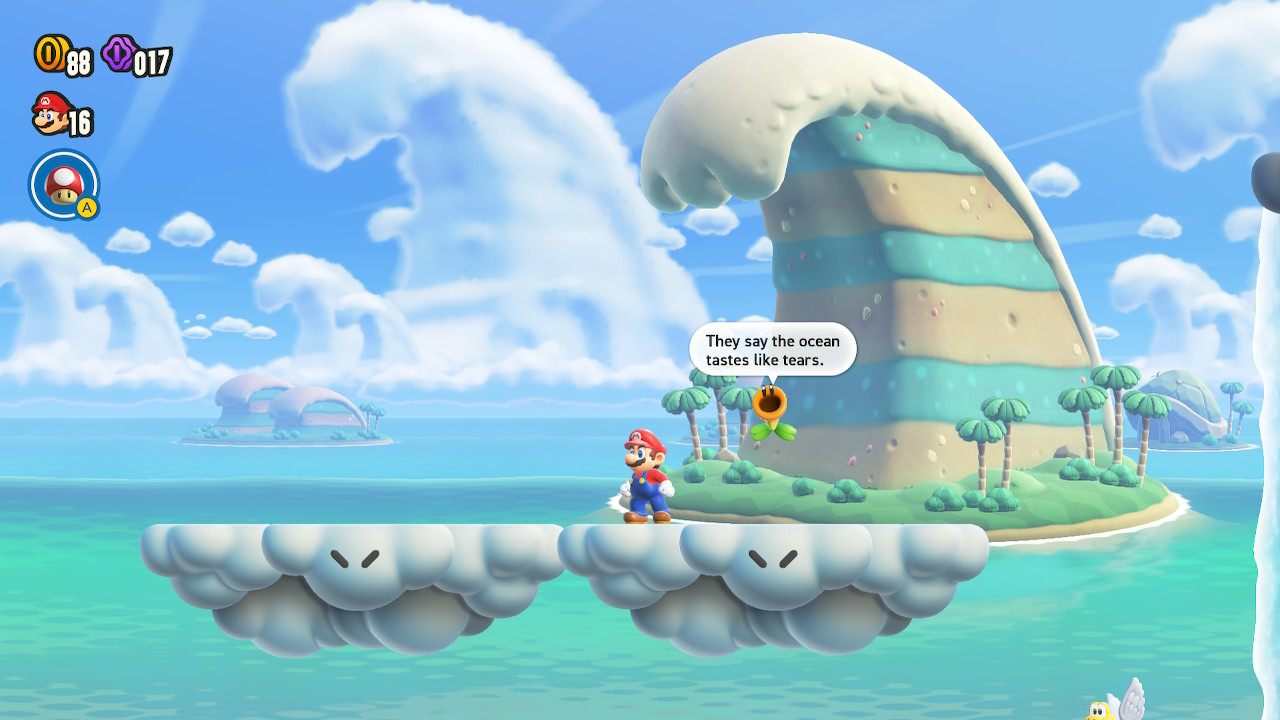
Even though this is a 2D game, Super Mario Bros. Wonder has some of the best visuals we’ve seen from Nintendo yet. Every course is multilayered and while you’ll most likely be focusing on the foreground while playing the game, I walked away very impressed with just how much is going on in the background. While it doesn’t stand out in quite the same way as Wonder’s levels, the overworld map has also received an overhaul which is quite noticeable when you compare it to the one in New Super Mario Bros. U Deluxe.
In docked mode, Super Mario Bros. Wonder has a dynamic resolution of 1080p that can drop down to as low as 864p on the overworld map. Meanwhile, in handheld mode, the game runs at 720p, though its visuals still look crisp running on either the original Nintendo Switch or the Nintendo Switch OLED. In either mode, Super Mario Bros. Wonder maintains a steady framerate of 60 fps.
As with other Mario games, the sound effects and music are a big part of the experience of playing Super Mario Bros. Wonder. In addition to some brand new songs, Nintendo has also included some variations on classic Mario tunes throughout the game. Another neat thing when it comes to sound is that the Elephant Fruit power-up slightly changes all of the songs. Percussion plays a big role in Super Mario Bros. Wonder and you’ll hear drums when you move throughout the game’s levels. Likewise, doing a ground pound emits a sound like a snare drum.
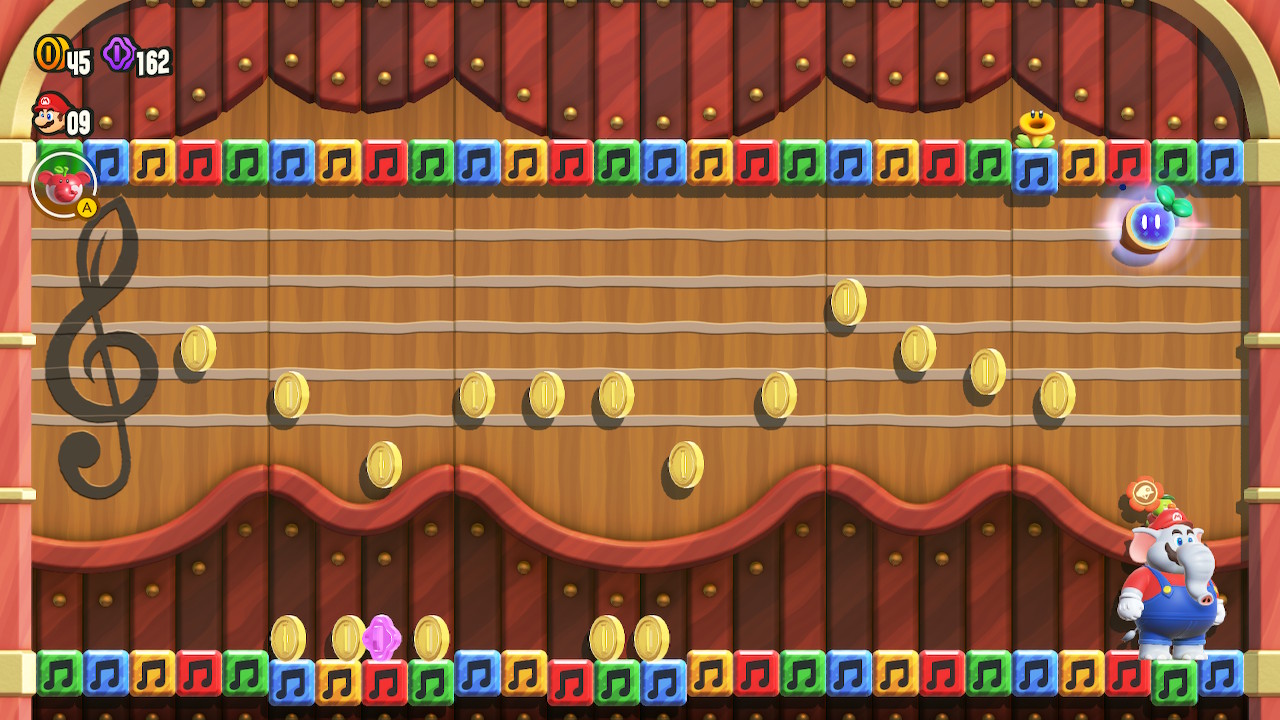
Super Mario Bros. Wonder also has eight different, rhythm-based music levels that you’ll want to play using either Joy-Cons or the Nintendo Switch Pro Controller. This is because Nintendo uses the HD rumble feature in its first-party controllers to play the sounds made by stepping on blocks (shown in the picture above) through your controller.
Mario games are known for their iconic theme tunes, and Super Mario Bros. Wonder does a great job of including your old favorites, while also introducing new songs and sound effects that help bring the Flower Kingdom to life.
Super Mario Bros. Wonder review: Multiplayer
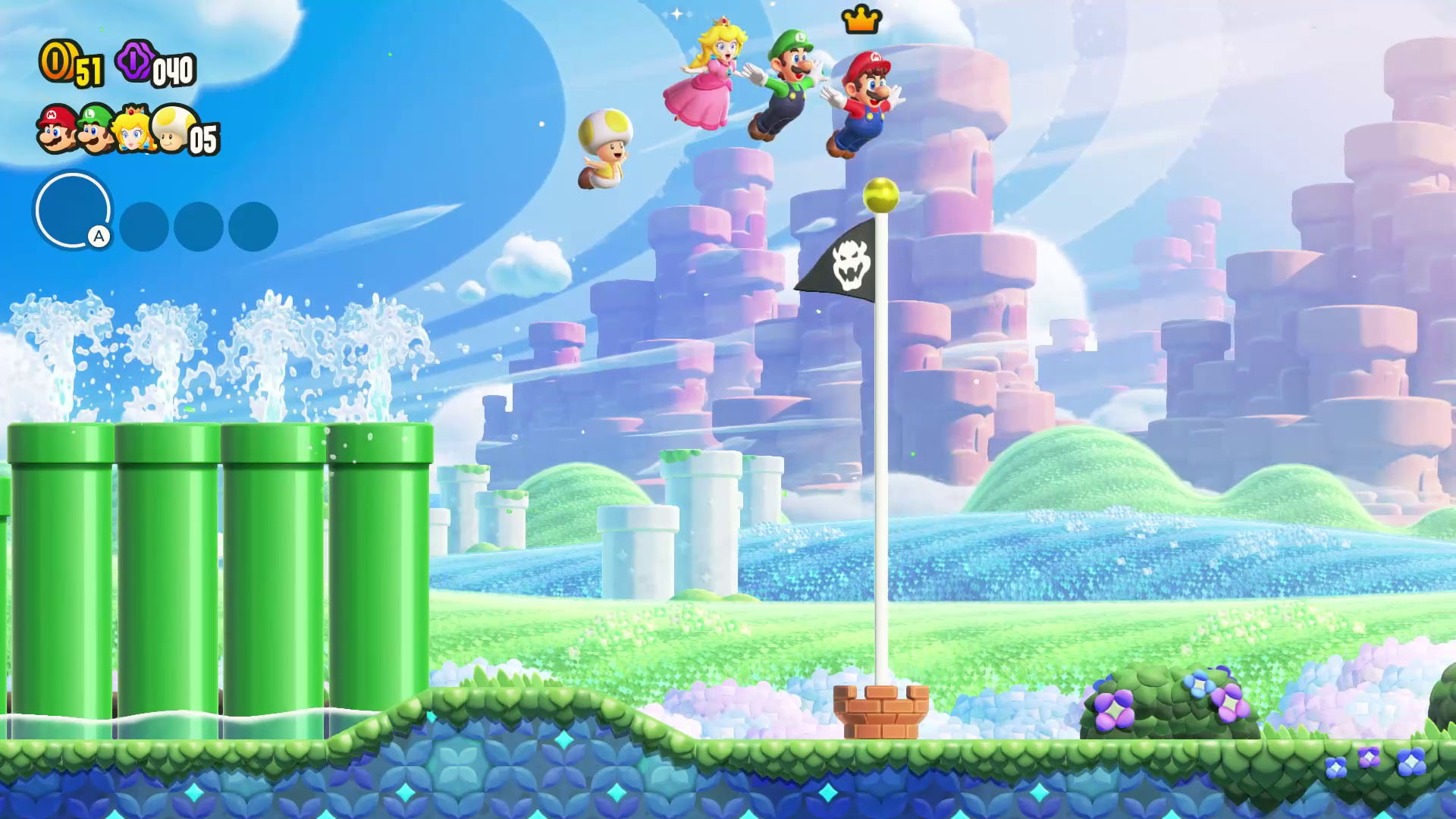
You don’t have to make your way through the Flower Kingdom alone since Super Mario Bros. Wonder supports up to four players either locally or online. In fact, even if you’ve been playing by yourself, you have the option to play with other gamers from right where you left off each time you start the game. Although it’s worth noting that there isn’t a way for each player to equip separate badges, meaning everyone will play each level the same way.
Though there are technically eight playable characters, there are also several reskins so that everyone can be a different color if they’re playing as Yoshi (green, red, yellow, light blue) or two for Toad (yellow and blue). Playing through a 2D Mario game with three other people can get chaotic, but that’s part of the fun and with Nabbit and Yoshi both immune to damage, parents will be able to easily play through the game with their younger children.
Super Mario Bros. Wonder can also be played online, either with your friends or with strangers. When playing with friends, you set up a private room and send out invites to whoever you want to join you. Online multiplayer with friends works in much the same way as local multiplayer, though the other characters on screen have a transparent look to them so that you can focus on your own character.
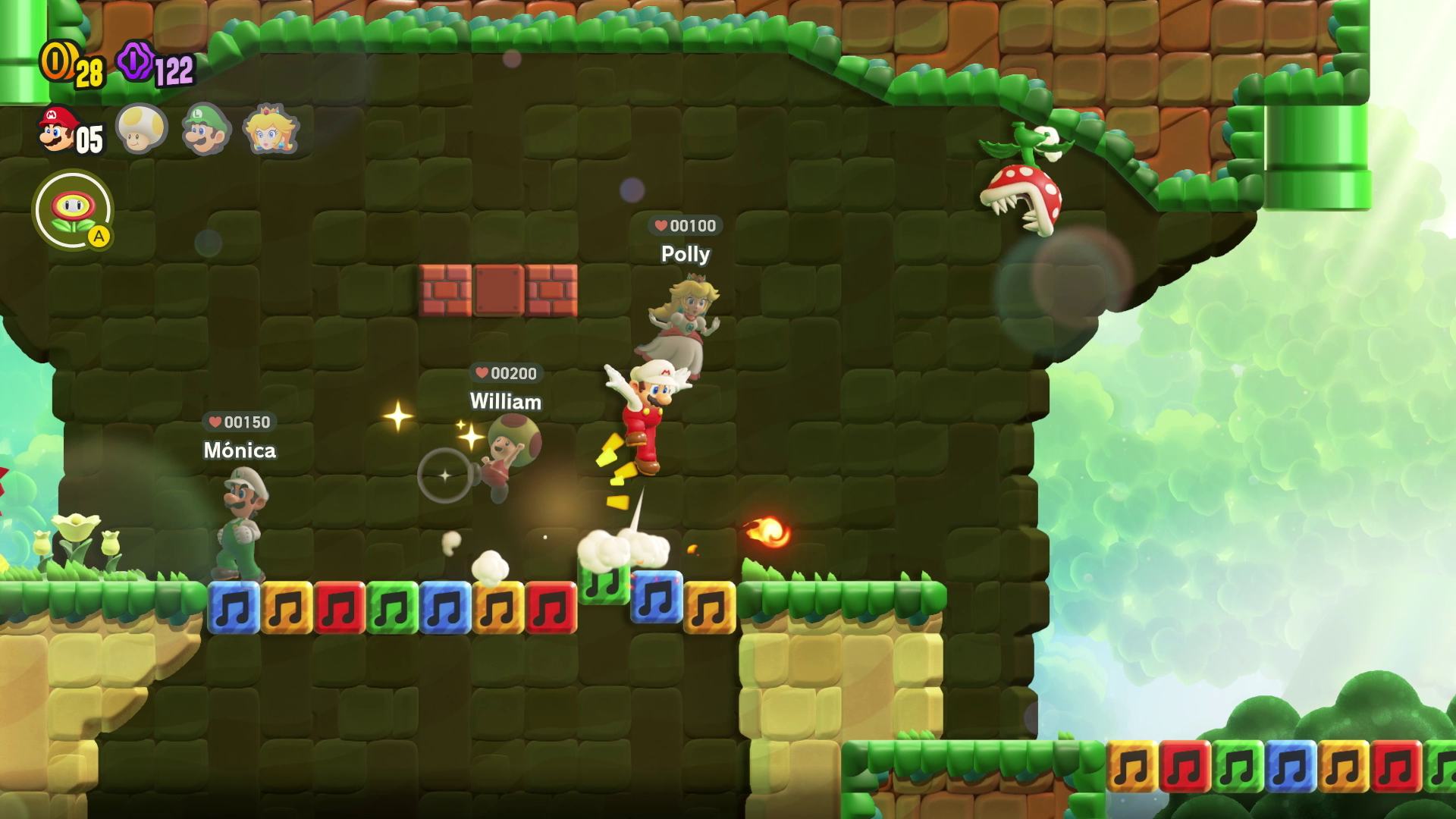
You can also play Super Mario Bros. Wonder online by yourself with players around the world pitching in to help you out in a similar vein to the online multiplayer in Dark Souls. These other players appear in levels and in the overworld map with you, though they still have a transparent look to them. Strangers can revive you when you’re knocked down and they can also help you out by beating the more difficult bosses for you. The whole experience is a lot of fun and it’s nice to see Nintendo take a new direction with online multiplayer in a Mario game.
Super Mario Bros. Wonder review: Verdict
As the first entirely new 2D Mario game for the Nintendo Switch, Super Mario Bros. Wonder was certainly worth the wait. Nintendo has put so much effort and attention into getting all of the small details right, while also making the game accessible for both seasoned Mario fans and newcomers alike. The new gameplay mechanics (like Wonder Flowers and the badge system) help breathe new life into the tried and true 2D Mario formula, while the enhanced visuals really help Super Mario Bros. Wonder shine. Likewise, being able to play the game with friends either locally or online makes this a Mario game you can keep coming back to once you finish the main story.
If 2D Mario games aren’t for you though, Super Mario 3D World might be a better fit, especially as it offers the same local multiplayer options found in Super Mario Bros. Wonder. However, if you go that route, you’ll be missing out on all of the new features, power-ups and sheer polish Nintendo has put into Super Mario Bros. Wonder. In the same way that many older gamers hold Super Mario World in high esteem, younger players will likely look back at this game with that same level of fondness years from now. If you enjoy a good platformer or just want to play as Mario with a few new tricks up your sleeve, you owe it to yourself to give Super Mario Bros. Wonder a try.

Anthony Spadafora is the managing editor for security and home office furniture at Tom’s Guide where he covers everything from data breaches to password managers and the best way to cover your whole home or business with Wi-Fi. He also reviews standing desks, office chairs and other home office accessories with a penchant for building desk setups. Before joining the team, Anthony wrote for ITProPortal while living in Korea and later for TechRadar Pro after moving back to the US. Based in Houston, Texas, when he’s not writing Anthony can be found tinkering with PCs and game consoles, managing cables and upgrading his smart home.
